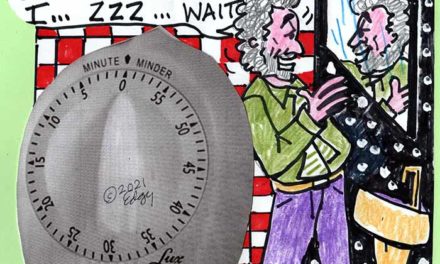You Say “Tomato”—I Say It’s Summer
Slicing into the approaching season—with oregano, of course
By Ed Goldman
One recent warm afternoon I sliced a very plump, very red tomato in half, sprinkled a little dried oregano on it and traveled to the Catskills Mountains, circa 1953.
You perhaps would like to ask me one or more of the following questions:
- Are you sure it was dried oregano, not medicinal cannabis?
- Since the Catskills are located in what used to be called New York’s “Borscht Belt”—where many Jewish comedians-to-be worked as counselors, entertainers and/or waiters—are you certain you didn’t slice in half a red beet, the star ingredient of beet borscht?
- Are you trying to alienate non-Jewish readers of this column?
In a red state
I was going to provide the answers upside-down below, as they do with magazine quizzes— like on abandonment issues and Your Authenticity IQ—but I didn’t want the blood to rush to your head as you tried to read them. So, in order:
(1) Yes, it was dried oregano. I’ll admit someone once talked me into toking on a pipe filled with dried basil so I definitely know the difference between my herbs. (For instance, I’ll never again try to flavor a hearty soup with weed);
(2) While agriculturally challenged, I also know the difference between a tomato and a beet (and not just that they’re spelled differently). For one thing, when you slice up a tomato rather than a beet, you won’t incur what resemble lasting blood stains on your food-prep island;
(3) Of course not. Why, some of my best friends are—well, you know…
Okay. Let’s get back. It’s time to start invoking writer Marcel Proust. The tomato will serve as a stunt double for the madeleine in his epic “Remembrance of Things Past.”
If you recall from reading it— or at least reading the Cliff’s notes version, or just convincingly pretending you read either of those—just tasting that tea cake plunges the book’s narrator into a nostalgic reverie.
Correspondingly, when I was three years old my family vacationed one summer in South Fallsburg, which is in the Catskills in upstate New York. As a city boy, until then I hadn’t been exposed to any fresh fruits or vegetables. I think my mom thought of canned fruit-cocktail as organic and canned peas as roughage.
So when she cut open a fresh, plump tomato and dashed a little oregano over it, I had no idea how I was supposed to eat it—or even if that’s what I was supposed to do with it. I mean, it was so juicy I probably could have used it as an astringent skin lotion or as a balm for my heat-chafed thighs.
When I did get around to tasting it, it was the first out-of-body experience I’d had since tumbling out of the above-referenced mom three years earlier. The flavors of the fruit itself, as well as the dried oregano, seemed to explode in my mouth before gently sliding down my gullet, seeds, skin and all.
Being a boy, I naturally asked for a second tomato—and couldn’t believe this day was actually happening because my mom said, “Of course,” which she never would’ve said if I’d wanted a second piece of cake. Laughing at my enthusiasm, she sliced open another tomato. This one she sprinkled with kosher salt, which was about the only thing in our home that was kosher.
I should explain that. Of the three acknowledged divides of Judaism at the time, there were orthodox, conservative and reform Jews. Orthodox Jews “kept kosher,” as they said, strictly observing the dietary laws set forth in the Torah. (For newcomers, the Torah is the Bible that gets stored in arks that sometimes get raided and lost, prompting archaeologists with fedoras and whips to find them.)
Reform Jews dispense with most Hebraic traditions, including the wearing of skullcaps (yarmulkes) either at home or in the temple. It’s too bad because those little beanies can really cover up one’s male-pattern baldness.
My folks were conservative Jews, at least in the sense of practicing their religion (their voting records were left-of-center). Conservatives are sometimes called “Shabbat” (Sabbath) Jews because when they turn up at temple it’s usually on Friday nights and the High Holy Days. Please note that the “High” in High Holy Days has nothing to do with dried oregano.
To conclude—yes, there is a God, and God apparently heard you, dear reader—biting into a fresh tomato on the last day of May reminds me that summer is coming and that I was once three years old. But only once.
Ed Goldman's column appears almost every Monday, Wednesday and Friday. A former daily columnist for the Sacramento Business Journal, as well as monthly columnist for Sacramento Magazine and Comstock’s Business Magazine, he’s the author of five books, two plays and one musical (so far).
Yes, Virginia
A Weekly Blog by Virginia Varela
President, Golden Pacific Bank, a Division of SoFi Bank, N.A.
photo by Phoebe Verkouw
“TARGETING SENIORS: ELDER FINANCIAL ABUSE IS REAL”
(Part 2 of a 3-Part Series)
You or someone you know could easily become the victim of a growing crime in America: the financial abuse of older Americans.
Seniors are increasingly becoming targets for this horrible lawbreaking. Since people over 50 years old control over 70 percent of the nation’s wealth, fraudsters are using new tactics to take advantage of retiring baby boomers and the growing number of older Americans.
Despite these threats, taking simple steps to safeguard personal information and being aware of warning signs can protect aging men and women from financial abuse.
What should you do to protect yourself? Here are 15 tips:
1. Plan ahead to protect your assets and to ensure your wishes are followed. Talk to someone at your financial institution, an attorney, or a financial advisor about the best options for you.
2. Shred receipts, bank statements and unused credit card offers before throwing them away.
3. Carefully choose a trustworthy person to act as your agent in all estate-planning matters.
4. Lock up your checkbook, account statements and other sensitive information when others will be in your home.
5. Order copies of your credit report once a year to ensure accuracy.
6. Never give personal information, including Social Security Number, account number or other financial information to anyone over the phone unless you initiated the call and the other party is trusted.
7. Never pay a fee or taxes to collect sweepstakes or lottery “winnings.”
8. Never rush into a financial decision. Ask for details in writing and get a second opinion.
9. Consult with a financial advisor or attorney before signing any document you don’t understand.
10. Get to know your banker and build a relationship with the people who handle your finances. They can look out for any suspicious activity related to your account.
11. Check references and credentials before hiring anyone. Don’t allow workers to have access to information about your finances.
12. Pay with checks and/or credit cards instead of cash to keep a paper trail.
13. Feel free to say “no.” After all, it’s your money.
14. You have the right not to be threatened or intimidated. If you think someone close to you is trying to take control of your finances, call your local Adult Protective Services or tell someone at your bank.
15. Trust your instincts. Exploiters and abusers often are very skilled. They can be charming and forceful in their effort to convince you to give up control of your finances. Don’t be fooled—if something doesn’t feel right, it may not be right. If it sounds too good to be true, it probably is.
At Golden Pacific Bank, a division of SoFi Bank, NA, we’re committed to helping seniors protect their money and assets.
I’m proud to report that we offer qualified seniors special GOLDEN REWARDS CHECKING ACCOUNTS. For more information—including customer qualifications, terms and features—contact a branch manager at a Golden Pacific Bank branch most convenient to you: www.goldenpacificbank.com.
sponsored content













